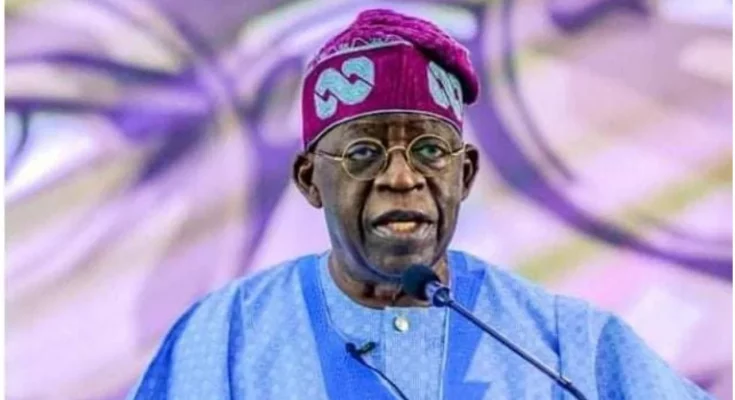Synopsis:
- a) 25% annual budget for education
- b) 10% annual budget for health
- c) Decentralisation of police
- d) Introduction of commodity exchange
- e) Total deregulation of oil market and building if national storage to sustain supply
- f) Stimulation of production and manufacturing for export
- g) Target of 15,000MW generation and distribution of electricity
The presidential candidate of the All Progressives Congress (APC), Bola Tinubu has unveiled seven-point agenda, titled: ‘My Vision for Nigeria’, aimed at transforming Nigeria if elected president of the country.
A statement by the Director of Media and Communication of his campaign organisation, Bayo Onanuga on Monday said Tinubu’s team will lead Nigeria to a new era of economic prosperity, peace, security and political stability.
According to him, security would be improved through decentralisation of the policing of the country and creating hundreds of thousands of new jobs simultaneously.
He promised to transform Nigeria into an enviable country and one where there will be justice, peace and prosperity for all, with a “robust economy” as well as a “a nation transformed into greatness, the pride of Africa, a role model for all black people worldwide, and respected among all other countries.
“A vibrant and thriving democracy and a prosperous nation with a fast-growing industrial base, capable of producing the most basic needs of the people and exporting to other countries of the world.
“A country with a robust economy, where prosperity is broadly shared by all irrespective of class, region, and religion.
“A nation where its people enjoy all the basic needs, including a safe and secure environment, abundant food, affordable shelter, health care, and quality primary education for all.
“A nation founded on justice, peace, and prosperity for all,” the statement said.
On economy, Tinubu promised to build an economy that will make the nation’s Gross Development Product grow quicker annually for the next four years while also providing jobs for millions of youths in the country.
He also promised to launch a new National Industrial Policy focused on special intervention to reinvigorate specific strategic industries.
“I will focus on stimulating jobs, which will be my top priority as President. I will get Nigeria to work by launching a major public works program, a significant and heavy investment in infrastructure, and value-adding manufacturing and agriculture.
“My administration will build an efficient, fast-growing, and well-diversified emerging economy with a real GDP growth averaging 12% annually for the next four years, translating into millions of new jobs during this period,” he said.
Tinubu also promised to create six new Regional Economic Development Agencies which will establish sub-regional industrial hubs to exploit each zone’s competitive advantage and optimise their potential for industrial growth.
The presidential aspirant also promised to formulate a new National Policy on Agriculture to boost food production.
He promised to promote the establishment of new commodity exchange boards, while also strengthening the one in Lagos in order to guarantee minimum pricing for agricultural products such as cotton, cocoa, rice, soya beans, corn, palm kernel, and groundnuts.
On infrastructure, Tinubu promised to “Build A New Nigeria (BANN)” by developing a National Infrastructure plan, which will cover strategic roads, bridges, rail, water, power, seaports, and airports spanning the length and breadth of the country.
He said his administration will combine government funding, borrowing, public private partnership, private sector financing and concession to initiate a medium and long-term financial model for the BANN initiative.
Tinubu further stated that his administration will target an electricity distribution goal of 15,000 megawatts across the country and ensure a sustainable 24/7 supply.
“On Electricity, I will embark on a renewed action-oriented focus and take immediate and urgent action on resolving existing challenges of power generation plants, gas purchasing, pricing, transmission, and distribution. My administration’s critical goal is to have 15,000 megawatts distributable to all categories of consumers nationwide to ensure 24/7 sustainable supply within the next four years,” he added.
On the oil and gas sector, Tinubu said there will be no need for a subsidy because the market will be open and transparent.
“Supply will come from local refineries, and the forces of demand and supply will determine the price of petroleum products.”
My administration will establish a National Strategic Reserve for Petroleum Products to stabilize supply during unexpected shortages or surplus periods. This will eliminate any form of product shortages and prevent wild swings in prices.
Tinubu also spoke about his administrations promise in the area of education, promising to increase the spending on education to 25 per cent of the nation’s budget.
He promised to continue the free school feeding programme of the APC, feeding “millions of primary school children across the country.”
On tertiary education, Tinubu said his administration eradicate strikes by tertiary institution workers by encouraging the tertiary institutions to source for funds through grants and corporate sponsorships, with all the institutions granted financial autonomy.
Tinubu also promised to increase the funding for health care in the annual budget to 10 per cent. According to him the National Health Insurance Scheme will be relaunched to grant health insurance cover to most Nigerians.



